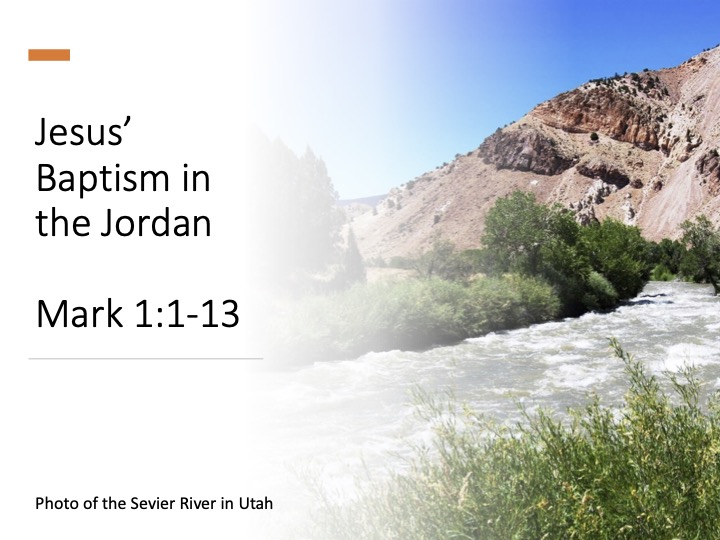Jeff Garrison
Mayberry and Bluemont Churches
January 7, 2024
Mark 1:1-13
At the beginning of worship:
Have you experienced temptation in your lives? How many of you have found yourself tempted shortly after experiencing something wonderful? Maybe you received a big promotion and then temptations came knocking at your door.
I have shared a lot with you about my ministry in Cedar City, Utah. Shortly after I arrived, the congregation set out to build a new facility to meet the need of a growing church in a growing city. We purchased the land and drew up plans. We raised money, broke ground, began construction. Exciting times.
But as construction started, we began to lose members. Several of our members, most of whom worked for the Park Service and the National Forest, were transferred. Others moved because of personal situations. In the first half of 1997, we lost 7 families, all who moved out of state.
It was a scary time. I worried if we were in over our head. I was temptation to throw in the towel. But all worked out. It became a reminder that life has its ups and downs, and we must trust God. Often, when we think we’re hot stuff, temptations overwhelm us. If we don’t learn to depend on God to provide, we faulter.
It was no different in Jesus’ earthly life as we’ll see in our text for today. At Jesus’ baptism, he’s confirmed by God. Jesus rides high, but instead of celebrating or getting right to work, he’s led to the desert to be tempted. Expect temptations.
Before the reading of scripture:
I plan to spend much of 2024 in the gospel of Mark. It’s the shortest of the gospels. Over the years, I’ve preached straight through much of the other gospels. And, of course, I’ve preached many sermons from Mark. But I have not gone through the book in a systematic fashion, chapter by chapter, verse by verse, seeing how the text lays out before us. Mark seems to be a good book for me to dig deep into to help us all develop a compressive understanding of the life and work our Savior. That’s my hope.
We must start somewhere. Matthew provides a genealogy of Jesus’, placing him in the line of David. Luke starts with angels setting up the birth of John the Baptist… John starts with Jesus’ being the Word present at creation.[1] And from these points they all go on to tell the story of Jesus.
Mark, however, doesn’t see himself writing a biography of Jesus. Instead, of a book, Mark writes a proclamation. He proclaims Jesus as Lord, as God’s son. He proclaims the truth found in Jesus. As the opening line goes, “The beginning of the good news of Jesus Christ…”
In these opening verses of Mark, it’s as if we’re provided a heavenly vantage point of the drama around God entering history.[2]
The good news or “gospel” (as it can also be translated) was a common word to Mark’s contemporaries. At this point in history, it had not taken on the technical definition it later would as in referring to the gospel as a book.[3]
The Greek word for the good news or gospel is where we obtain the English words evangelical and evangelist. The good news, the gospel, or the Greek evangelion, was used to proclaim a victory or a great event. At the time of Jesus’ birth, on Caesar Augustus birthday, people shouted evangelion, proclaiming Augustus as the leader who brings peace.
But with Mark, there’s a subtle difference. The Romans used the word in the plural. Caesar birth or a victory on a battlefield was only one piece of good news among many. It might be the headline story in the evening news, but there were others. Mark and the other gospel writers use the word in the singular. Jesus is the good news; there is no other.[4]
Read Marks 1:1-13
Mark begins his gospel (again, it’s not a book, it’s a proclamation) with John the Baptist. The role the baptizer plays shows God fulfilling divine plans set forth centuries earlier. As we have in the other gospels, the Baptizer is heralded as the one fulfilling Isaiah’s promise.
We are provided a bit more insight into John the Baptist in Mark than in John’s gospel, which we looked at during Advent.[5]However, Mark is still concise, especially when compared to Matthew and Luke. He portrays John’s role to prepare for Christ, then quickly moves to Jesus’ baptism. Mark isn’t proclaiming John, only using him to point to the subject of his proclamation.
During this era of Judaism, there was a belief Elijah would return before the Messiah. For Mark, John role portrays an Elijah-like[6]character who serves as the forerunner to the one “more-powerful.”[7] Like Elijah, John is associated with the wilderness and his dress, which would have been as unusual back then as today, was Elijah-like.[8] Elijah also wore a garment of animal hair with a leather belt.[9]
What Mark suggests to us about John’s baptism is that it’s symbolic. It points to what’s coming. John prepares people for the one who will baptize us with the Holy Spirit, a prophecy fulfilled on Pentecost.[10]
Mark doesn’t provide us with a dialogue between John and Jesus prior to his baptism as does Matthew,[11] nor does he give us a first-person account of it. Instead, he reports Jesus’ baptism something that has happened. Instead of focusing on the details in the Jordan, Mark reports on God’s action. As Jesus came up out of the water, he saw the heavens torn apart as the Spirit descends as a dove. And then God speaks. “You are my Son, the Beloved.” When God speaks, grammatically the text shifts from the past tense to the present.
The rending of heaven and God’s proclamation show us something miraculous and cosmic happens. God steps into history. Here, at the baptism, the three persons of the Trinity are represented. The Son, who was baptized, the dove who symbolizes God’s Spirit, and the voice of God the Father.
Mark, it’s generally assumed, wrote for a Gentile audience, and draws less from the Old Testament than the other gospels.[12]Gentiles would have not been as familiar with the Old Testament; yet his narrative around Jesus’ baptism is steeped in the Hebrew Bible. Like the humble servant of Isaiah, God’s splendor is displayed in the Son. And God refers to Jesus as the Beloved, which reminds us of Abraham’s love of Isaac, who was to continue to carry the promise.[13] Mark wants to place Jesus in the lineage of what God started with the call of Abraham.
Furthermore, by referring to Jesus as God’s Son, we see the bond between the Father and Son, the one in which the Son is not only of God, nor can only speak for God, but is God. As we go through Mark, we’ll see the Son doing the things of God: forgiving sin, healing the sick, casting out demons, controlling the weather, and challenging the religious authorities of the day.
After his baptism and confirmation, we’d think Jesus would punch in on the time clock and start working. But before Jesus starts, or to change metaphors before he gets off pit-row and onto the racetrack, there’s a speed bump. God has an adversary who wants to destroy this new challenger on earth before he can get very far.
Unlike Matthew and Luke,[14] Mark only provides the bare minimum of information about Jesus’ temptation. But like both other gospel writers, it occurs right after Jesus’ baptism. All three Gospels speak of God’s Spirit leading Jesus into the wilderness where he faces temptations. But instead of telling us about the type of temptation he faced, Mark provides only a few bits of information. The wilderness experience lasted forty days. Satan tempted Jesus. During this period, Jesus lived among wild beasts. And angels waited on him.
This brief description of the temptation continues Mark’s display of God directing and controlling the events. It’s an overhead view of what happens before Jesus starts his ministry. Mark has set the stage. Next week, God willing, we’ll watch as Jesus’ ministry unfold.
These opening verses in Mark’s gospel are like the opening of John’s gospel. They serve as a prologue. They prepare us for what is to come, reminding us that Jesus is not just a special man, but is God’s answer for the human situation. Jesus is the good news. To him we are to praise, and to follow. In him, we find life and our hope. Amen.
[1] Matthew 1:1-17, Luke 1:5-25, and John 1:1-18.
[2] Morna D. Hooker, The Gospel According to Saint Mark (1991, Hendrickson Publishers, 1997), 32
[3] Hooker, 33.
[4] James R. Edwards, The Gospel According to Mark (Grand Rapids, MI: Eerdmans, 2002), 24.
[5] See https://fromarockyhillside.com/2023/12/17/a-voice-crying-out-in-the-wilderness/
[6] As we saw in the John passage, the Baptizer didn’t see himself as Elijah, which is why I use the term “Elijah-like character.” See John 1:21.
[7] Edwards, 29.
[8] Edwards 32. Edwards cites 1 Kings 1:8 for Elijah’s dress, obviously a typing error that was not caught in proof-reading.
[9] 2 Kings 1:8
[10] Acts 2ff.
[11] Matthew 3:13-15.
[12] Edwards, 26. Mark may have been written in Rome and uses more Latin terms. See William Lane, The New International Commentary on the New Testament: Gospel of Mark (Grand Rapids, MI: Eerdmans, 1974), 24-25.
[13] Edwards, 36-38. See Isaiah 49 and 42:1 and Genesis 22.
[14] See Matthew 4:1-11 and Luke 4:1-13.



Temptation is pretty much everywhere at this point. I hope you have a nice week. I love that last picture.
Thanks, the river was running high the day I took that photo (I think in 2007 or 8)
I find a lot of peace in trusting God.
Amen! “Be still and know I am God,” -Psalm 46:10
“we must trust God” You are absolutely right. Why do I have to learn this lesson over and over!?
I look forward to your sermons working through Mark’s Gospel.
Thanks, I am looking forward not only to preaching them, but to spend the year doing an in-depth study of the book